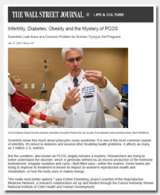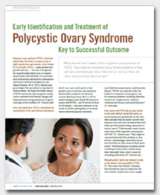Polycystic Ovary Syndrome (PCOS)
Find Your Care
Whether you need a preventative examination, pregnancy care or treatment for a gynecological condition, our OB/GYN specialists are here for you.
Call 310-794-7274 to schedule an appointment today.
PCOS: Symptoms, Treatment and Diagnosis
PCOS Survey
Do you have PCOS and are 18 years of age or older? Or does your daughter have PCOS? If so, we would like to invite you to participate in a survey. The surveys can be found at:
Patient Survey (PDF) | Parent Survey (PDF)
Surveys Available Now!
What is PCOS?
Polycystic ovary syndrome is the most common hormone abnormality of reproductive-aged women, occurring in up to 10% of such individuals. It is characterized by overproduction of the androgen testosterone, menstrual abnormalities when ovulation does not occur and enlarged ovaries containing multiple small follicles (polycystic ovaries).
Women with severe PCOS have greater menstrual irregularity, androgen excess, more total and abdominal fat and resistance to insulin; and also have more severe risk factors for diabetes and cardiovascular disease than women with less severe forms of PCOS.
Polycystic ovary syndrome is more prevalent among family members than in the general population, suggesting that genes can influence the development of PCOS. Lifestyle, including diet and exercise, also affects the severity of PCOS, with weight gain worsening both reproductive and metabolic abnormalities.
Consequently, PCOS can adversely impair a woman’s health by increasing her risks for infertility, obstetrical complications, diabetes and cardiovascular disease. Diagnosing PCOS depends upon identifying whether a woman has 1) androgen excess, 2) disorders of ovulation and/or 3) polycystic ovaries, while eliminating other illnesses that mimic PCOS.
2015 PCOS Awareness Symposium
How is PCOS Diagnosed?
The first step in diagnosing PCOS is to have a complete history and physical examination performed by a trained health care provider. A careful history and physical examination can detect whether androgen excess is causing male-pattern hair growth (hirsutism), acne or hair loss and whether ovulation is occurring normally. Physical examination also can detect high blood pressure and increased abdominal obesity as risk factors for diabetes and cardiovascular disease in individuals who are overweight.
Blood tests can then be performed to determine whether the ovaries are functioning normally or producing excess amounts of androgen. An ovarian ultrasound also can be done to measure the size of the ovaries and determine whether they have a polycystic appearance. At the same time, other conditions resembling PCOS, including pituitary, thyroid and adrenal abnormalities and other rare tumors, can be identified. Fasting blood levels of glucose, triglyceride and cholesterol also can be measured, along with another glucose determination obtained 2 hours after ingesting a glucose solution (2-hour oral glucose tolerance test), to predict the risk for developing diabetes and cardiovascular disease.
Polycystic Ovary Syndrome Infertility
Before attempting to conceive, it is important to recognize that PCOS women are at increased risk of diabetes, hypertension and other complications of pregnancy. Therefore, medical consultation is advised for any PCOS woman wishing to conceive to optimize her chance of having a normal pregnancy.
Lack of ovulation (monthly release of an egg from the ovary) is the predominant cause for infertility in PCOS women, although some individuals also may have a higher rate of miscarriage. In some PCOS women who are overweight, diet combined with exercise can restore ovulation without the use of medications.
Otherwise, several medications are available to restore ovulation in PCOS women. Oral clomiphene citrate stimulates FSH secretion from a woman’s own pituitary (located at the base of the skull) to induce ovarian follicle growth. Subcutaneous injections of gonadotropins with FSH and LH can induce the same events, if necessary. Both medications increase the chance of multiple births, although FSH injections are the most powerful. Other medications include metformin, an insulin sensitizer that slowly lowers insulin and androgen levels to gradually induce ovulation with a lower chance of multiple births. Medications that block estrogen production to stimulate FSH secretion (letrozol) also exist, but additional studies are needed before they can be routinely recommended for ovulation induction. Since most PCOS women ovulate following medical therapy, surgery or in-vitro fertilization (IVF) are generally reserved for PCOS women who fail to ovulate with medication or have other fertility problems.
Skin manifestations
One PCOS symptom is Hirsutism. This is treated with a combination of approaches, including oral contraceptives with or without an antiandrogen, such as spironolactone, to lower levels or block actions of androgen on hair follicles. Oral contraceptives are often combined with antiandrogens to improve their clinical effect and to prevent pregnancy, since accidental exposure of the male fetus to antiantrogens can harm fetal development. A topical cream (eflornithine hydrochloride) also can be applied to treat facial hirsutism.
Medical therapy inhibits hair growth without eliminating hair already present. Therefore, medical therapy usually is combined with mechanical methods of hair removal, such as electrolysis or lasers. Electrolysis refers to the insertion of an electrode to destroy individual hair follicles. It is ideal for removing small areas of sparse hair of any color.
Laser hair removal is a common, safe and effective cosmetic procedure that also is performed for removal of unwanted facial and body hair. Laser therapy is more expensive than electrolysis but is faster, less painful, and requires fewer sessions. Laser therapy destroys hair by targeting the pigment (melanin) in the hair follicle and is ideally suited for dark-haired, light-skinned individuals.
Longer-wavelength lasers with cooling devices can be used for individuals who have red, true blond, or white hair and for dark-skinned people. With appropriate therapy, there is up to a 70% reduction in hair density in treated areas, with remaining hairs becoming thinner in diameter within 3-6 months of treatment. Most patients then require some degree of maintenance treatment, usually every 6-12 months.
Acne is usually treated with oral contraceptives and topical or antibiotic therapies. Hair loss may require androgen suppression combined with antiandrogen therapy and topical means of stimulating hair regrowth.
Prevention of diabetes and cardiovascular disease
A 2-hour oral glucose tolerance test can be easily performed to assess the risk of diabetes in a PCOS woman. If necessary, prevention of diabetes may require lifestyle management with weight loss, diet and exercise, and possibly the addition of insulin-sensitizing agents such as metformin, or other medications. Fasting lipid measurements in the blood also can be performed to predict the risk for future cardiovascular disease and may likewise require lifestyle management, along with oral statins and other medications to correct increased triglyceride and low-density lipoprotein (LDL)-cholesterol levels and/or decreased high-density lipoprotein cholesterol (HDL-C) levels.
Quality of life
There is growing evidence that mood disturbances, mostly severe depression, are common in PCOS women, in whom impaired quality of life from body image concerns cause fatigue, sleep disturbance and changes in eating habits. In addition, many PCOS patients report feeling abnormal, unfeminine, and embarrassed due to unwanted hair, often hiding their hair growth and covering their face when talking to others. Understanding how a woman feels about her body image and improving this perception are essential components of any management plan that provides overall health care to women with PCOS.
Support: Women's Healthcare Research
Participate: Clinical Trials
Women’s Health Clinical Research

Infertility, Diabetes, Obesity and the Mystery of PCOS

